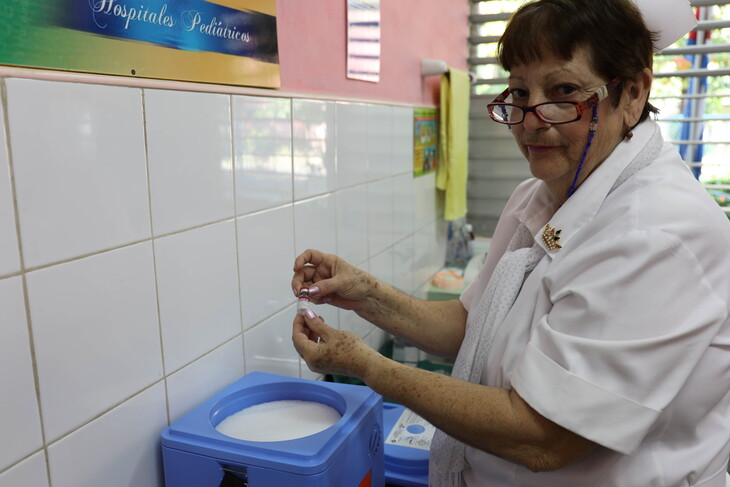
Carmen Pérez, 63, graduated from nursing school 46 years ago, and for the past decade has worked in the vaccination unit of the 19 de Abril Polyclinic in Havana, Cuba. In 2018, donations made by Iberia customers to UNICEF funded the tripple vaccines for 80% of the Cuban babies younger than one year old.
The week of 24-30 April is World Immunization Week, a reminded that vaccines prevent fatal and crippling illnesses in people of all ages.
That is why we are sharing a story that isn't strictly about Iberia, though it does have links to the airline, and especially to its customers.
Since 2013, Iberia has worked alongside Amadeus with the Spanish UNICEF Committee in a micro-donation programme in which people buying air tickets on iberia.com are invited to donate 3 to 20 euros to UNICEF’s vaccination campaigns.
So far, Iberia customers have donated more than 943,000 euros, which has paid for the vaccinations of more than a million children in Angola, Chad, and Cuba. Since last July all donations support vaccinate projects in Cuba.
"I’m proud and happy with my daily work. Everybody here knows me. I really enjoy working with families, explaining the vaccination programme and how important vaccinations are for their children’s health.
In the vaccination unit, I’m in charge of the registry of each month’s births, and of the months when the different vaccinations are scheduled, and I check them off as they are given. In a single day, I may vaccinate between 20 and 30 children from two to 18 months old.
The MMR triple viral jab is very important. It immunises them against mumps, chicken pox, and measles. The first dose is given at one year, and at six they get a booster shot in school.
These three diseases have been eliminated in Cuba –measles since 1993, chicken pox since 1995, and mumps since 2011, along with Congenital Rubella Syndrome since 1989. Other illnesses that have been also eradicated in our country are poliomyelitis since 1962, diphtheria since 1979 and whooping cough since 1994, thanks to the National Immunization Programme, which is free and covers the entire population.
Our country is very grateful to Iberia and its customers, and to the Spanish Committee of UNICEF for their donations of MMR vaccine. These help to make sure that all Cuban children are vaccinated and protected from viruses that may enter the country from a high-risk international environment.
The vaccine unit is like my home. I keep it clean and tidy. Even when I am on holiday and the relief nurse takes over, I tend to drop by to check that everything is OK. For the moment, I’m not thinking about retirement. While my strength and health allow, I will keep on working. And if I was born again, I’d study nursing again, because it’s the profession I like best in this whole world.
Listening to the families is what gives me the most satisfaction. See what Idania González, the 32 -year-old mother of one-year-old Gabriela, who had her first dose of MMR vaccine, wrote: “Nurse Carmen and the entire staff of the Polyclinic always ask how my baby is, and they call us at home if we forget a vaccination date. Cuba has a health system that looks after the children, and I want to tell all mothers and fathers that vaccinations are very important so their children will grow up to be strong and healthy. Vaccinations do work. Since Gabriela was born, Nurse Carmen has given her all the vaccinations to protect her against 13 childhood diseases.”